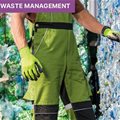As global environmental concerns intensify and regulators respond with stricter Extended Producer Responsibility (EPR) laws, businesses operating in South Africa's electrical and electronic equipment sector face a critical juncture. EPR compliance is no longer optional; it's a strategic imperative to mitigate risk and unlock new opportunities.

Giulio Airaga is MD of Desco Electronic Recyclers
The e-waste problem in South Africa is escalating rapidly. With an estimated 360,000 tons generated annually, and the Gauteng province alone accounting for 55% of this total, the environmental and economic consequences are substantial.
In November 2021, a significant milestone passed for manufacturers, importers, and distributors dealing with electric and electronic equipment, lighting products, batteries, and packaging.
Although the new EPR legislation places the responsibility on importers and manufacturers to ensure environmentally friendly management of their products, which may include product recycling, its success could be severely impeded if consumers remain uninformed about how to handle their old appliances.
The EPR legislation marking a pivotal moment in the country's efforts to address the mounting issue of e-waste and promote a circular economy.
This legislation obligates producers to take responsibility for their products throughout their entire lifecycle, ensuring responsible recycling and disposal at the end of their usefulness.
Curb e-waste enthusiasm
The aim of EPR legislation is clear: to curb the environmental impact of waste products, particularly e-waste and lithium-ion batteries, which have long plagued landfills and ecosystems.
However, while the legislation presents a necessary step forward, its implementation has faced challenges and met with resistance from producers.
EPR legislation encompasses a range of products, including e-waste, lighting, batteries, and packaging. Among these, e-waste and lithium-ion batteries stand out as focal points due to their significant environmental impact and complex recycling requirements.
As a result, many producers have turned to independent companies for assistance in the complexities of EPR compliance, particularly in the realm of e-waste and battery recycling.
Through pilot studies and investment in technology these companies developed specialised solutions for lithium-ion battery recycling, providing producers with a viable option for responsible disposal.
However, despite the availability of recycling solutions, producers have faced reluctance and pushback in complying with EPR legislation.
For many, the prospect of additional costs and administrative burdens associated with EPR compliance has been met with resistance with the role of Producer Responsibility Organisations (PROs) in enforcing compliance leading to further apprehension among producers.
Driving positive change
By providing transparent reporting and tailored solutions, these partner companies enable producers to meet their obligations under the law while minimising the administrative burden and costs associated with compliance.
Central to its approach is the emphasis on choosing the right PRO and ensuring transparent communication between producers, recyclers, and regulatory authorities.
By facilitating direct access to data and compliance reporting, a good PRO can empower producers to make informed decisions and advocate for their interests within the EPR framework.
Through innovation, collaboration, and advocacy, these companies aim to drive positive change in the electronic recycling industry and pave the way for a more sustainable future.


































